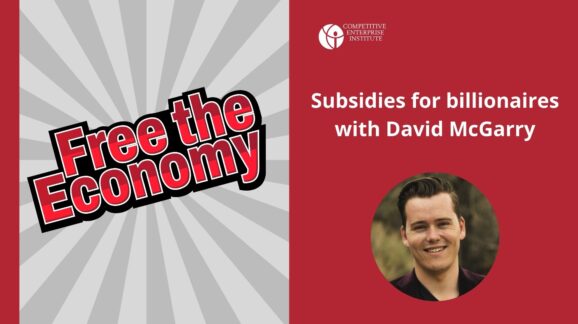There are two main areas in which Congress can enact meaningful reform. The first is to rein in regulatory guidance documents, which we refer to as “regulatory dark matter,” whereby agencies regulate through Federal Register notices, guidance documents, and other means outside standard rulemaking procedure. The second is to enact a series of reforms to increase agency transparency and accountability of all regulation and guidance. These include annual regulatory report cards for rulemaking agencies and regulatory cost estimates from the Office of Management and Budget for more than just a small subset of rules.
In 2019, President Trump signed two executive orders aimed at stopping the practice of agencies using guidance documents to effectively implement policy without going through the legally required notice and comment process.
Featured Posts

Blog
Free the Economy podcast: Subsidies for billionaires with David McGarry
In this week’s episode we cover White House intervention in corporate ownership, the nation’s falling economic freedom ranking, and welcome new…

News Release
Federal appeals court rules on NLRB unconstitutionality
The 5th Circuit Court of Appeals today issued a ruling suggesting the structure of the federal government’s top labor dispute regulator, the National Labor Relations…

Blog
The week in regulations: Import paperwork and postal possession
The 2025 Federal Register topped 40,000 pages. President Trump met with Vladimir Putin in Alaska. The Producer Price index rose at its fastest level since…
Search Posts
Blog
How a New President Can Roll Back Bureaucracy, Part 8: Transparency Report Cards
Improving disclosure and transparency for regulatory output and trends is one area where a new president can unambiguously undertake unilateral initiatives without statutory regulatory reform.
Blog
How a New President Can Roll Back Bureaucracy, Part 7: Track Regulatory Accumulation
This is the seventh entry in a series on how the next president can reduce the scope of bureaucracy. Earlier installments have addressed a freeze on…
Blog
This Week in Ridiculous Regulations
Agencies issued more than six dozen new final regulations last week, ranging from minerals to dates.
Blog
How a New President Can Roll Back Bureaucracy, Part 6: Enhance Disclosure in ‘Unified Agenda’
There are rules, and then there are rules. Agencies are supposed to alert the public to their priorities in the semi-annual “Regulatory Plan and Unified…
Washington Post
How Trump would stimulate the U.S. economy
The Washington Post highlights Wayne Crews's calculated cost of federal regulations from his anual Ten Thousand Commandments report. Beyond trade, America’s Gulliver economy…
Blog
How a New President Can Roll Back Bureaucracy, Part 5: Scrutinize Informal ‘Guidance’ Documents
When a new president scrutinizes agency rules as we have called for in this series, he or she also needs to bring “guidance documents” under…
Staff & Scholars

Clyde Wayne Crews
Fred L. Smith Fellow in Regulatory Studies
- Business and Government
- Consumer Freedom
- Deregulation

Ryan Young
Senior Economist
- Antitrust
- Business and Government
- Regulatory Reform

Fred L. Smith, Jr.
Founder; Chairman Emeritus
- Automobiles and Roads
- Aviation
- Business and Government

Sam Kazman
Counsel Emeritus
- Antitrust
- Automobiles and Roads
- Banking and Finance

Marlo Lewis, Jr.
Senior Fellow
- Climate
- Energy
- Energy and Environment